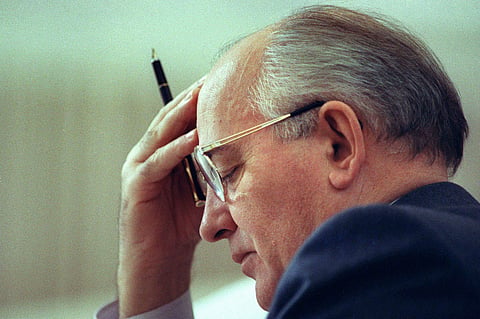
- NEWS
- the EDIT
- COMMENTARY
- BUSINESS
- LIFE
- SHOW
- ACTION
- GLOBAL GOALS
- SNAPS
- DYARYO TIRADA
- MORE

Moscow, Russia (AFP) — The momentous era of ex-Soviet leader Mikhail Gorbachev, who has died aged 91, was often defined by buzzwords and slogans.
From perestroika to glasnost to "Gorbymania," here are five of the best-known.
Perestroika
Shorthand for Gorbachev's drive to modernize the Soviet economy and society, perestroika means change or reform.
In early 1985, Gorbachev said in a speech: "It's obvious, comrades, that we all need to change. All of us."
He used a verb that means changing formation when marching or changing lane when driving.
The noun perestroika is also used to refer to reconstructing buildings.
The word was taken up and became a slogan encapsulating the era.
Glasnost
Glasnost means making information public as a topic for discussion. The term was initially used about reforms in the tsarist era.
Gorbachev first talked about this in February 1986. At first it referred to ordinary Soviet citizens being able to criticize state and Communist party organizations.
But later the word came to mean much more: An end to official censorship and blocking of foreign radio stations as well as publishing previously banned literature.
No sex in the USSR
A Soviet woman's response to a question from an American on a popular talk show aired in both countries in 1986 has gone down in history as expressing prudish and naive attitudes allegedly present in the Soviet Union.
"Commercials have a lot to do with sex in our country. Do you have commercials on television?" an American woman asked on a show with all-women studio audiences hosted by Phil Donahue and Vladimir Pozner.
A woman in the audience in Leningrad, Lyudmila Ivanova, responded: "We don't have sex and we are categorically against this."
Another woman in the audience promptly shouts: "We do have sex. We don't have commercials!"
Ivanova in 2010 told newspaper Metro that she had added "we have love" but the phrase was cut from the show.
Gorby
In Russia, Gorbachev is normally referred to by his name and patronymic: Mikhail Sergeyevich. But in the mid-1980s, Western media began shortening his name to Gorby and referring to his rising popularity as "Gorbymania."
Sobriety
One of Gorbachev's most unpopular reforms aimed to address the Soviet Union's economic woes by cutting down on excessive drinking. In 1985, a central committee resolution was passed and printed in all the newspapers. The slogan was "Sobriety is the norm of life."
To make alcohol harder to buy, Gorbachev ordered limits on hours that alcohol could be sold in shops, causing huge queues.
He also ordered the destruction of many of the country's vineyards, hitting the legal drinks industry hard and encouraging people to make their own moonshine. The campaign eventually petered out.
